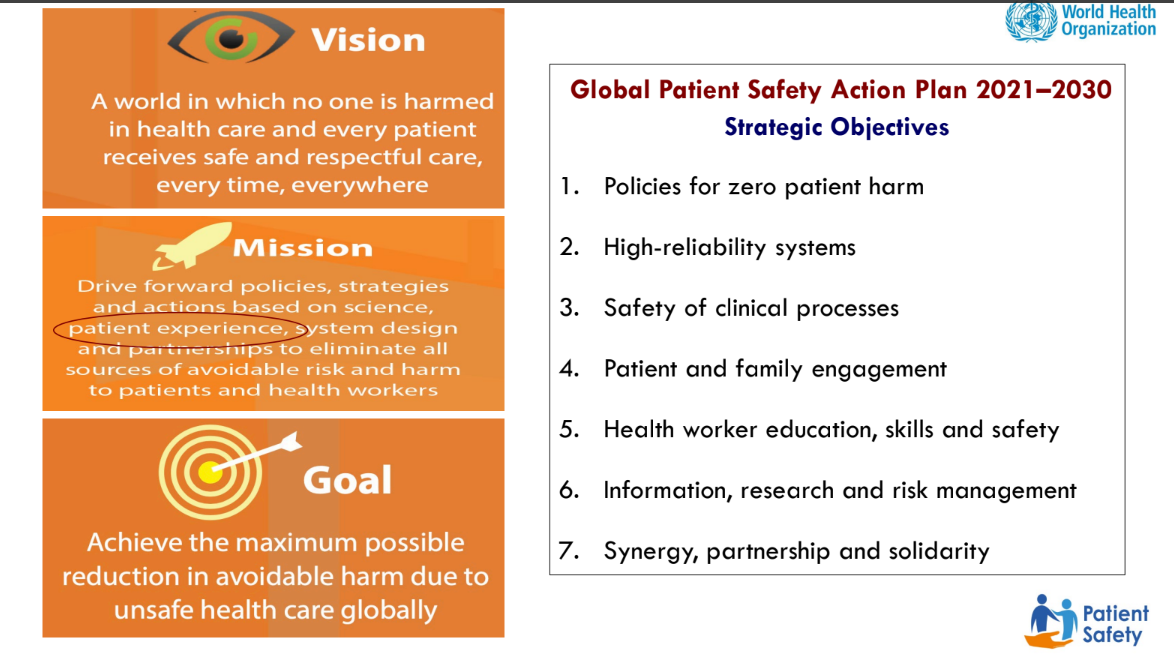At the 10th Global Patients Congress #GPC2023 on 19-20 May, Dr Neelam provided an overview of the WHO Global Patient Safety Action Plan 2021-2030 and the importance of patients, caregivers, and families’ participation.
So, what is patient safety?
Patient safety is: “A framework of organized activities that creates cultures, processes, procedures, behaviours, technologies and environments in health care that consistently and sustainably lower risks, reduce the occurrence of avoidable harm, make errors less likely and reduce the impact of harm when it does occur.” (WHO, 2021)
Traditionally, the idea of safety in healthcare systems was limited to fire incidents, equipment failure, preventing falls, the risk of infection or unexpected complications like a transfusion of the wrong blood group and surgical procedure done on the wrong organ. Unfortunately, these mistakes were treated as inevitable costs in a fast-moving and pressurized working environment. Then in the 1990s, studies showed that the frequency of adverse outcomes amongst hospital patients was substantial, and when things went wrong, it was seldom due to an error by a single medical staff. Instead, “medical error” occurs because of poor design and operation of the healthcare systems. Thus, a more holistic concept to describe the safety risks in health care and the measures to address these risks and patient harm is “patient safety.”
How big is the problem of unsafe health care globally?
According to WHO, on average, an estimated one in 10 patients is subject to unsafe health care in high-income countries and in low and middle-income countries (LMICs), it is as high as 134 million adverse events, contributing to around 2.6 million deaths annually.
What is WHO and policy leaders doing about it?
At the 72nd World Health Assembly in 2019, the resolution WHA72.6 on global action on patient safety was adopted, leading to the development of the Global Action Plan 2021-2030. In 2021 at the 74th Assembly, the Global Patient Safety Action Plan was adopted with the vision of “a world in which no one is harmed in health care, and every patient receives safe and respectful care, every time, everywhere.” Among the seven Strategic Objectives, Objective 4 – Meaningful Patient and Family Engagement is the strongest pillar of the Action Plan framework.
 To achieve the maximum possible zero patient harm due to unsafe health care, patients, families, and informal care partners/carers must be informed, involved, and treated as full partners in their care and users of the health care system. They should be provided with platforms to participate at every level of health care, ranging from policy making and planning to performance oversight, to fully informed consent and shared decision-making at the point of care.
To achieve the maximum possible zero patient harm due to unsafe health care, patients, families, and informal care partners/carers must be informed, involved, and treated as full partners in their care and users of the health care system. They should be provided with platforms to participate at every level of health care, ranging from policy making and planning to performance oversight, to fully informed consent and shared decision-making at the point of care.
The insights from the lived experience of the patient and family engagement can be utilized at different levels of the framework:
Co-development of policies and programs with patients, ranging from national policies through to bedside and clinical practices
Learning from patient experience for safety improvement since they are the end users of the health care system
Build a network of Patient Advocates and encourage health care leaders to champion patient participation
Disclosure of patient safety incident to victims and patients should be able to escalate their concerns within a health care organization
Provide information and education to patients and families for their involvement in self-care and empowerment for shared-decision making
Patient Advocacy in Dementia
Dementia patients’ voices are hardly prominent in many health care systems, for several reasons like stigma and discrimination, the perception of mental incapacity and lack of understanding of dementia among healthcare policymakers and professionals. Hence, it is crucial for us to be part of the national or local hospital patient advocacy network so that we become “visible” patients with a voice to collaborate and influence. It is difficult to call for change when one is outside the health care system.
As a patient advocate, you work from the inside of the system, and it is easier to have your voice heard and more opportunities to collaborate to improve the patient’s safety and experience. Since my appointment as a member of the SingHealth Patient Advocacy Network (SPAN) which is under the Institute for Patient Safety and Quality, I have been involved in focus groups discussions in environmental designs, sharing patient experience with healthcare workers and have the chance to work with Agency for Care Effectiveness on Health and Technology Assessment.
For more information on the WHO Global Patient Safety Action Plan click here
Since you’re here…
We’re asking you to support our members, by donating to or partnering with our organization. With more than 55.2 million people living with dementia, our work has never been more important. Donating or partnering with us will make a difference to the lives of people with dementia: https://www.dementiaallianceinternati...
Membership of, and services provided by Dementia Alliance International is FREE, and open to anyone with a diagnosis of any type of dementia. Join DAI here: /get-support/become-a-member
Read our newsletters or regular blogs, by subscribing here: /blog
About DAI: Dementia Alliance International (DAI) is a non-profit group of people with dementia from around the world seeking to represent, support, and educate others living with the disease that it is possible to live more positively than advised with dementia. It is an organization that promotes a unified voice of strength, advocacy and support in the fight for individual autonomy, improved quality of life, and for the human and legal rights of all with dementia and their families.
